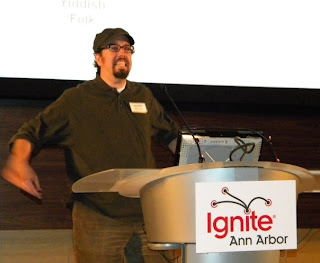I'm continually surprised and delighted by the strong resurgence in Sephardic music that's been happening for the last few years. Ljuba Davis, a mainstay of the West Coast Jewish music scene, has been performing for decades and has added to that resurgence by finally put out a recording of her own. One that Ari, of Klezmershack has referred to as "one of a small (but growing!) number of traditional Sephardic music CDs worth listening to."
That's high praise. And a good thing.
Here's a recording from Davis' record release party at Drom in NYC.
Here's a bit from her official bio:
"The words of Ljuba Davis’s feisty paternal grandmother always stuck with her, as did her father’s penchant to spit at any mention of the Jewish people's expulsion from Spain. The expulsion in the 15th century sent the Sephardim moving ever further east, to the Ottoman and Russian Empires.
A gifted singer and fluent Spanish speaker, Davis was fascinated by the morsels of Sephardic melodies—secular and liturgical—she encountered as a child, and later on recordings and in songbooks. She went to nursing school (where she sang in the hospital’s resonant stairwells), raised seven children, and gradually gathered dozens of prized Ladino traditional songs into her repertoire.
A veteran performer, Davis contributed to the fascinating intersection of Jewish music revival and the folk movement, performing on major stages and in small clubs from Chicago to her Bay Area home. Berkeley was a hotspot of Jewish music creativity in the 1960s, and Davis was a sought-after singer and cultural trailblazer in the community.
But it wasn’t until she went to Barcelona—and until her son David Davis (who produced the album and plays the radiant cello on “Durme”) began to encourage her to record—that Davis contemplated making an album of her uniquely heartfelt renditions and the stunning melodies of the Ladino tradition."
While I haven't had the opportunity to hear the full album, the reviews look stellar. Delarue, author of the review "Haunting Spanish-Jewish Sounds from Ljuba Davis" in the New York Music Daily, notes the album contains
"flamenco-tinged acoustic guitars, but the lead lines are carried just as often as by Avram Pengas’ spiky, incisive bouzouki or Rachid Halihal’s oud. The melodies refer to gypsy music, the Middle East or the Balkans just as often as they evoke their Spanish home turf. Davis sings in a nuanced voice that can be quiet and plaintive but also joyous, sailing up to the end of a phrase on the album’s second track with the kind of microtonal “whoop” that’s common in Bulgarian music."
For more information, check out Davis' website and CDBaby.








